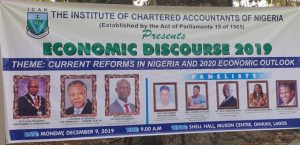Spaces for Change’s director joined other experts and panelists at the 2019 ICAN Economic Discourse, Current Reforms in Nigeria and 2020 Economic Outlook, held on Monday, December 9, 2019 at the MUSON Centre in Lagos. The discourse organized by the Institute of Chartered Accountants of Nigeria aimed to assess Nigeria’s economic performance at the year end, through an unbiased appraisal of current and proposed economic reforms and proffer “well-thought-out recommendations” to the Nigerian government for bolstering the country’s economic vitality. The discourse proceeds upon the premise that previous economic reforms and programmes appear to have been less effective in putting the country on the path of sustainable development, hence an urgent need for a critical assessment and an unbiased appraisal of current reforms were urgently required.
The panelists include Professor Mohammed Muttaka Usman of Ahmadu Bello University, Zaria; Professor Ademola Oyejide of University of Ibadan; Dr. Isaac Nwaogwugwu of Department of Economics, University of Lagos; Mr. Tayo Ogungbenro of KPMG Nigeria, Victoria Ibezim-Ohaeri of Spaces for Change and the guest speaker, Dr. Biodun Adedipe of Biodun Adedipe Associates. The event brought together over 200 accountants, economic analysts, tax experts, industry regulators, bankers, academics and other stakeholders in the public and private sectors of the Nigerian economy.
Although oil is the mainstay of the Nigerian economy, dominating the country’s foreign exchange earnings, it accounts for less than 10 per cent of our GDP. In the last 10 years especially, six other sectors have made major contributions to national GDP. They include: agriculture, trade, ICT, manufacturing, mining and quarry and real estate. The performance of these various sectors therefore constitute indicators of Nigeria’s economic health. The guest speaker’s paper examined in great depth, the contributions of these sectors to national growth and development, while flagging the opportunities for reform. In his words, “The last data we had in September shows that those six sectors accounted for 80.2 per cent of Nigeria’s GDP. That tells us the area that we should be focusing on in terms of reforms to create jobs. Job creation is the whole essence of the difference between growth and development.”
Ms. Ohaeri’s presentation harped on the need to ensure Nigeria’s current economic reforms, specifically the 2020 budget, border closure and the tax increases proposed in the 2019 Finance Bill, do not push the most vulnerable, including informal sector operators, over the edge through restrictive imports, the formalization of businesses and excessive taxation. The Nigerian informal sector is a major contributor to the Nigerian economy, accounting for about 65% of Nigeria’s 2017 GDP. Economic programs of government could only be said to be successful when they ease inequality and bridge income disparities between the rich and the poor. Economic policies that either ignore or hurt the informal sector operators and the vulnerable groups dims the economy’s otherwise positive outlook.
In a bid to tackle smuggling, Nigeria closed its land borders with Benin, Niger and Cameroon in October 2019, banning all exports and imports through those routes. The sudden announcement of the order closure gave traders and communities little time to prepare for the economic shock that followed. Within days, food prices rose by almost 100%, putting a strain on the budgets of low-income households. The foods most affected by the border closure include rice, frozen chicken and tomatoes, all of which are staple foods predominantly sold by women.
The Nigerian government claims that the border closure has bolstered local agriculture and local production of goods. However, for reforms to be sustainable, the impact of economic policies such as border closure on the livelihoods on vulnerable groups such as the poor and women needs to be carefully studied and mitigated. Not only that, experts have also said that the closure of Nigerian borders to free trade in the sub-region contravenes certain regional treaties. An example is the protocol on the free movement of goods, services and people established by the Economic Community of West African States (ECOWAS), to which Nigeria is a signatory. Another example is the African Continental Free Trade Area (AfCFTA), which aims to remove barriers to trade and promote the free flow of goods, services and people across the African continent. All of these concerns require strategic official consideration and attention.
Another issue that dominated discussions is the 2019 Finance Bill which sets the tone for Nigeria’s fiscal policy for 2020. Among other things, the bill seeks to increase the value-added tax (VAT) from five per cent to 7.5 per cent. The bill will also reform the tax regime by amending several Acts, namely Petroleum Profit Tax Act (PPT), Custom and Excise Tax Act, Company Income Tax Act (CITA), Personal Income Tax Act, Value Added Tax Act, Stamp Duties Tax Act, and Capital Gains Act. It imposes an obligation for citizens to have a Tax Identification Number in order to open and operate a business bank account. The bill’s focus on taxation is tantamount to encouraging the formalization of local businesses. Ms. Ohaeri advocated that the shift from informal to formal will take many years, and not something to be rushed suddenly.
The discourse provoked robust discussions between the audience and the panelists on a wide range of issues affecting the economy, such as subsidies on petroleum products, national security, unilateral trade restrictions and poverty reduction. Among other key recommendations from the discourse, participants noted that the 2020 budget cycle of January to December is commendable and should be maintained. However, the budget only addresses the economy at aggregate level and does not address the micro problems in the economy. Government should translate the budget provisions into addressing poverty and other micro-level problems. Furthermore, while the 2019 Finance Bill widened the tax net; and granted/withdrew certain incentives, the tax incentives granted should be extended to the informal sector. The government was urged to should device means for collecting affordable taxes from the informal sector.





















